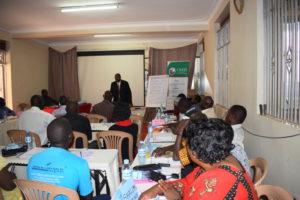1ST JULY 2015 – 30TH JUNE 2016
The Community Land Security Project (CLSP II) commenced on 1st July 2015 and closed on 30th June 2016. The project that was supported by the DGF sought to promote the livelihoods of the local people in the Albertine region with particular focus on Hoima, Buliisa and Nebbi districts. CLSP II sought to enhance knowledge of rights for all and to support vulnerable groups who are at risk of losing their rights due to the oil industry.
The project was implemented at the community, district and national levels. At the Community level, CRED implemented sensitization campaigns, provided legal advice to people in need of it, and directly supported selected community cases in court. In house CRED lawyers also provided backstopping to ensure that community interests are safeguarded during court processes.
First, through sensitization, this project promoted awareness of land rights. CRED sensitized 3,135 people (2249 Males and 886 Females). These were mostly vulnerable communities that have either been displaced or threatened with displacement. Many of the communities reached are now able to speak for their rights. At least 8 community groups (with over 8000 individuals) claimed for their rights in courts of law, with the support of CRED. Similarly, 11 community groups applied to the Ministry of Lands, Housing and Urban Development (MLHUD) to be constituted as Communal Land Associations (CLAs). As a result, these 11 groups were enlisted for support under the ongoing CEDP project that is being implemented by the MLHUD with support from the World Bank.
Second, CRED facilitated trainings for local leaders in the project districts. The trainings enhanced the understanding of leaders about the governing laws, policies and administrative best practices for securing tenure rights. The trainings also created opportunities for dialogue and self-reflection amongst the leaders. 194 leaders were trained in the districts of Hoima and Buliisa. As a result, there is more responsiveness on the part of the local leaders to the plight of the people. For example, Hoima and Buliisa districts resolved to adopt Certificates of Customary Ownership (CCOs) to secure tenure rights for customary land owners. In addition, Buliisa district embarked on developing a District Land Ordinance with the view of streamlining land issues in the district.
Because of the campaign conducted by CRED on land rights in the Albertine region, several government and opposition leaders visited the camps where displaced people are living especially in the district of Hoima. CRED pieced together petitions addressed to several leaders in government and in the opposition. In addition, CRED worked with the DGF to organize a field visit for nine European Ambassadors to Rwamutonga camp, where hundreds of households were displaced following a violent eviction from their customary holdings. This work informed the debate on the land question which dominated the presidential and parliamentary elections of 2016. As a result, the government made a number of reforms aimed at overcoming the land challenges facing the country. For example, the Ministry of Lands with support from the World Bank started on the process of formulating a resettlement policy for Uganda. CRED was invited to be part of this Policy working Group.
Third, CRED scaled and deepened its work on providing legal advisory and probono legal services to vulnerable communities. At least 291 people (212 Males and 79 Females) received direct legal advice from CRED lawyers. In addition, 15 families, 11 community groups and 3 churches benefited from CRED legal advice. 3 disputes were successfully resolved through mediation. 2 court cases (Applications) were successfully ruled upon by the High Court of Masindi. Notable among these is the declaration by Court that the eviction in Rwamutonga was irregular and unlawful. This ruling is instructive as it has been an advocacy tool for the affected people. On the basis of this ruling, CRED supported the affected persons to institute a suit for compensation for destroyed properties.
Lastly, CRED organized capacity building events for leaders in the project districts. At least 194 leaders were trained, including members of District Land Boards (DLBs) and Area Land Committees (ALCs). These training not only imparted the much needed knowledge and skills to the participants but also created platforms for dialogue and self-reflection amongst the leaders. In addition, CRED organized platforms for demanding accountability from leaders. Citizen-Judicial open forums were organized, where judicial leaders dialogued with the court users on the administration of land justice. CRED also created platforms for RDCs to dialogue with communities on land issues. These engagements enhanced opportunities for amicable resolution of disputes in the oil region. For example, these engagements helped in restoring normalcy in Rwengabi Village where the local community and Bunyoro Kitara Kingdom officials were engaged in a violent conflict.


